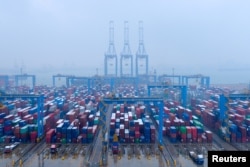American and Chinese trade negotiators made progress during "candid and constructive discussions" Friday in Beijing and will continue talks in Washington next week, according to the White House.
The two sides are working to strike a deal to lift eight-month-old tariffs affecting $250 billion of Chinese imports to the United States and about $110 billion of American exports to China.
The latest round of talks comes amid a report by the Bureau of Economic Analysis that the U.S. trade deficit with China again rose in 2018.
"The 2018 goods and services trade deficit with China alone was $379 billion. That's $70 billion, or 23 percent, higher than in 2016. It's more than 3 times the size of the 2018 deficit with the entire European Union. China by itself contributed 61 percent of the total U.S. deficit both in 2016 and last year," according to Derek Scissors, Resident Scholar of American Enterprise Institute.
U.S. Treasury Secretary Steven Mnuchin, who is in Beijing, posted on Twitter that the talks will continue next week.
The United States is demanding deep changes to Chinese industrial policy, including an end to large-scale state intervention in markets and policies that force foreign companies to transfer technology to their Chinese partners.
China is considering several reforms aimed at addressing Washington's concerns, including ending forced technology transfers and opening more parts of its economy to foreign competitors. But analysts say the key to persuading Washington will be in how Beijing enforces the new policies.
"At this stage, the U.S. side wants more than just renewed reform pledges. They want to see meaningful commitment that they can enforce and follow through," said Julian Evans-Pritchard, senior China economist at Capital Economics.
Even with pledges from the central government to improve the climate for foreign businesses, enforcing those policies across China can widely vary depending on the preferences of local officials, said University of South Carolina business professor John Olin.
"In China, local authorities always have ways of getting around policies from higher up, and there is strong local protectionism among provinces and cities, which even the Communist Party can't do much about."
VOA Mandarin service reporters Ning Xin and Jingxun Li contributed to this report.





